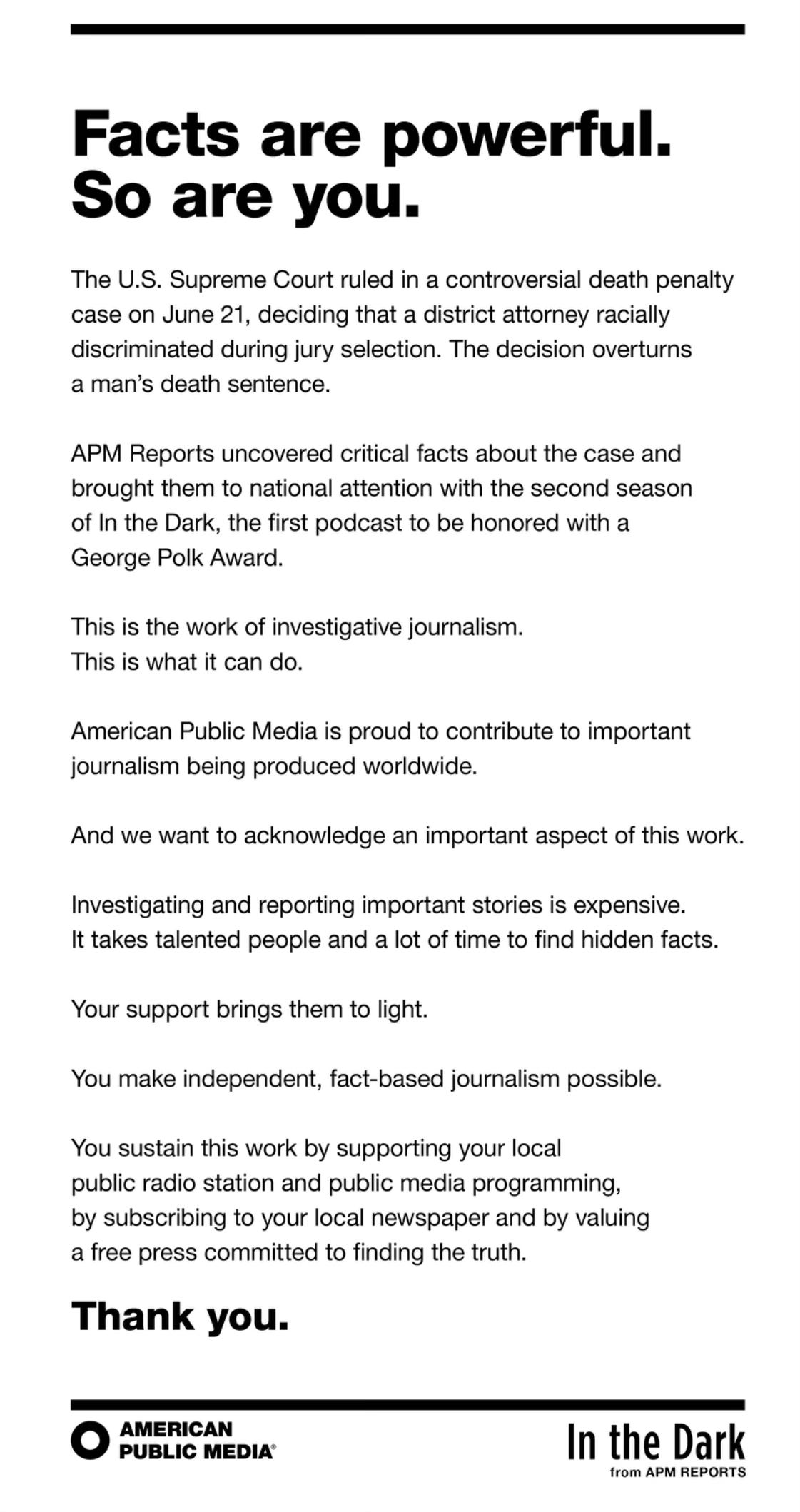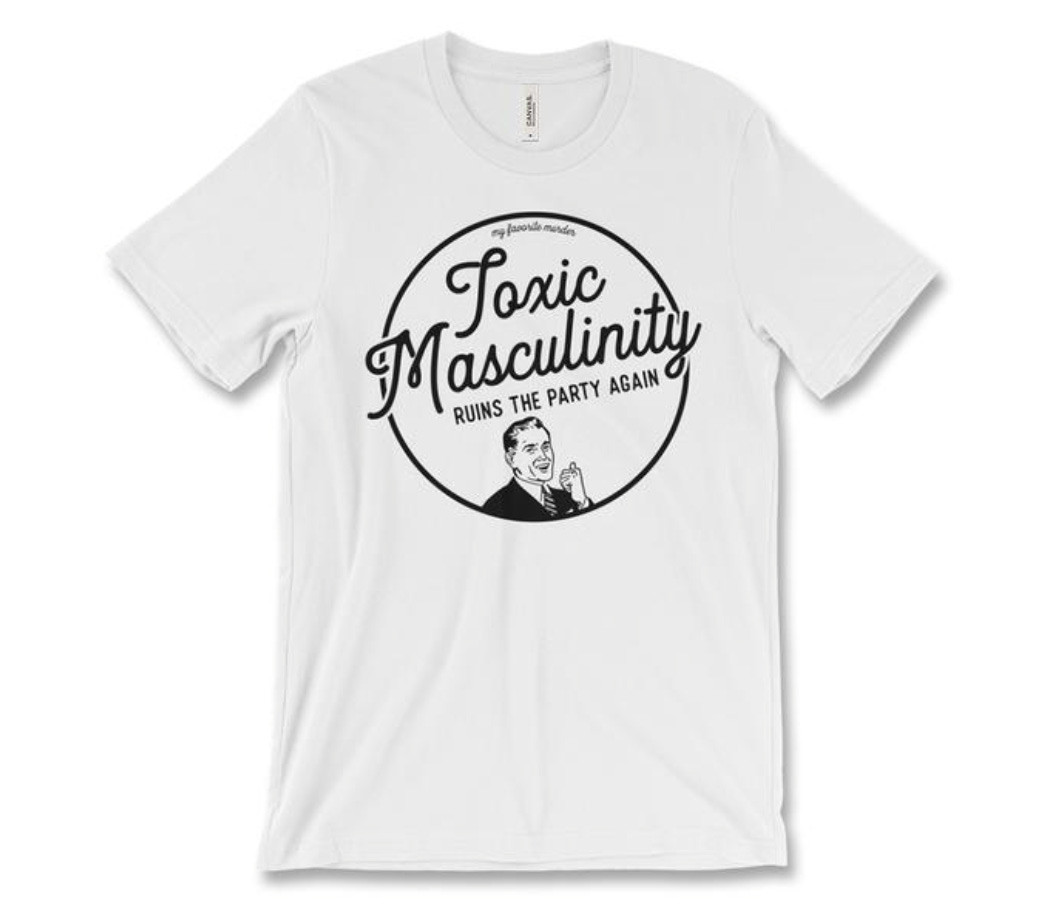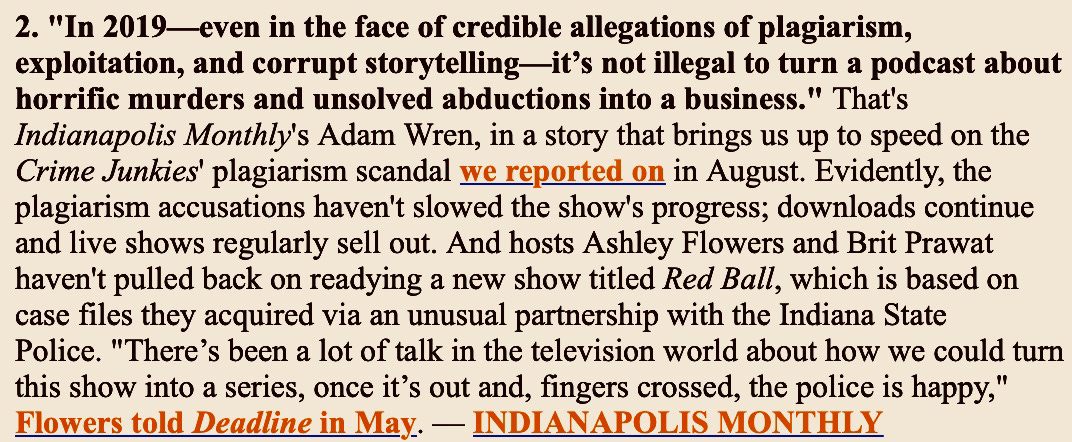An Old Lawsuit Throws True Crime Podcasting Into Disarray
Can the Community Find Its Moral Center? Plus: Updates on MPR|APM's Axing of In the Dark
Hello, dear reader!
In this issue:
Updates to last week’s piece;
A dispatch from the world of true crime podcasting.
Let’s hit it!
Updates Regarding APM|MPR’s Axing of In the Dark

In the Dark’s data-crunching whiz Will Craft announced that he’s been laid off; his final day was last Friday;
A PR rep from APM|MPR told me that six of the positions ended on July 22, 2022 and two will remain in place until this fall;
A source informed me that “it’s pretty fair to say” that the primary reporting staff of In the Dark was laid off entirely (sob!);
According to former employees at the company, in the months and years leading up to this decision:
One person was assigned to market podcast properties at APM|MPR, while a team of six to eight individuals supported broadcast radio;
Management said selling a sponsorship for In the Dark wouldn’t work because its “narrative/short run nature was too hard to sell compared to weeklies” and “the subject matter was too dark/heavy and controversial”;
Despite having no official marketing budget, the station’s leadership decided to run a full page advertisement in the Sunday edition of the New York Times after In the Dark’s reporting helped overturn a man’s death sentence. A source told me that “it was a huge example of APM patting itself on the back and using In the Dark for marketing/branding purposes”;
A press release titled “Following Supreme Court ruling, American Public Media recognizes necessity and support of free press in full-page New York Times ad” was issued on the same day;
Here’s the full-page ad.
A former employee sent me the following note:
There are a lot of good smart people there doing brilliant work but some of the organizational decisions are very confusing.
My theory is that for a long time bc radio is such a simple business model, they were able to prioritize good work and mission and remain financially stable. In the shift to digital, you’re trying to beat out millions of podcasts vs a small handful of radio stations. And they are simply not equipped to solve that business challenge.
To be clear I love APM - I loved working there, the business, the mission. But nonprofits are underprepared to thrive in a highly competitive, hard to monetize business landscape like podcasting.
And finally, a recent issue of Pod Mov Daily featured a short write up about the piece that included some great additional points (bolded text mine):
The show’s output is especially baffling as an excuse. "While In The Dark journalism was nationally recognized, the team was only able to produce two seasons in six years," Pillsbury was told via email. (Two and a half, really.) Only able? This vast underappreciation isn’t just about time.
In the fall of 2020, Mpls.St.Paul profiled Madeleine Baran, In the Dark’s host and lead reporter. The timeline is wild. Months of pre-reporting determine if a case is worth the commitment, wrote Dara Moskowitz Grumdahl. "Then comes the investigation, which takes as long as it takes — maybe a year or more."
The team described months of 12-hour days in a mold-infested rental. “A new sort of around-the-clock labor began" when they returned with thousands of hours of tape and thousands of documents.
Based on the Mpls.St.Paul article alone, two-and-a-half seasons in six years is just…math. Investigative journalism on this level is a staggeringly complex process, and it’s a shame that the podcast’s necessary timeline is treated like a liability.
Can True Crime Find Its Moral Center?
[True crime] content creators talk about all of these known predators in the media, Harvey Weinstein, Bill Cosby, Larry Nasser. So why is it that when it's somebody within the true crime circle, everyone becomes silent?
— Celene Beth Calderon-Olsen, true crime creator and victim advocate
Last May, Exactly Right, the network founded by Karen Kilgariff and Georgia Hardstark (hosts of the hit podcast My Favorite Murder), announced the end of Jensen & Holes: The Murder Squad. The tweet framed the news as “the end of an era,” and said episodes would be available until August 1st.

The announcement was a head scratcher. Murder Squad was a hit show with an engaged fanbase. Moreover, while ceasing production on a show happens pretty much on the regular, removing a show’s back catalog, and thus, its advertising inventory, is much rarer. What was going on?
I wasn’t the only one to wonder, though you wouldn’t have known that from looking at the replies, as they were closed to everyone besides those mentioned in the tweet (and therefore, everyone).
A quasi-explanation emerged when Jenn Tisdale, one-half of the podcast Too Many Jennifers, revealed in a June 15th episode that she had been deposed in a lawsuit filed against Exactly Right by a former producer at the company. According to Tisdale, the employee had claimed that during her tenure at Exactly Right, she had been sexually harassed by Murder Squad co-host Billy Jensen. According to Tisdale:
The higher ups [at Exactly Right] investigated it, but during that time, they asked this person to continue to work with Billy…so because of the way that the person was treated by Exactly Right, they decided to take legal action against the company.
Tisdale added that the complaint had been settled in mediation. (Another source told me it had been “resolved” and would not comment on whether a financial settlement had been made.)
The irony was thick. If Tisdale’s story was true, it meant that when push came to shove, Exactly Right’s founders — who make their living reminding their “legions of female fans” to be wary of creepy men, and selling merch with phrases like “toxic masculinity ruins the party again” emblazoned across the front — weren’t exactly living their fuck-the-patriarchy brand .
During the podcast, Tisdale had also related that her deposition in the case was related to a separate incident in which Jensen had (non-consensually) slapped her in the face. Tisdale’s story appeared to be a catalyst for others to come forward; within days, victim advocate and true crime podcaster Celene Beth Calderon-Olsen and Affirmative Murder host Alvin Williams shared that they had been deposed as well.
Up to this point, Jensen himself had remained quiet. But after HarperCollins postponed the publication of a book he’d authored, he took action. First, he posted a note apologizing for “hugging and putting my arm around my colleagues” at the event where the alleged misconduct had taken place. “I now understand that was unwelcome, and I am deeply sorry,” he wrote. He also uploaded over 50 screenshots of private texts between himself and Tisdale over the course of their friendship as part of a second post. If the goal was to discredit her story, it didn’t do the job.
A rumor began to spread that Jensen had retained defamation law firm Clare Locke, notorious for — according to this story in Buzzfeed — representing Russian oligarchs, Sarah Palin, and “#MeToo villains” including Matt Lauer. (Jensen and Clare Locke could not be reached for comment.)
With momentum building, I reached out to Exactly Right. Their silence had created a vacuum into which fans were coming up with all manner of theories. As a former publicist, I felt sure that Exactly Right would be readying a statement.
It turned out that I was extremely wrong.
After that failed, I reached out Calderon-Olsen, who had been assigned to be the complainant’s ‘victim advocate’ on the case. In her words, this meant, in part, that she had been “privy to the whole situation.” I figured she might have insights that would help me understand the reasons behind Exactly Right’s tight lips, or sort through the nuances of the situation.

Like me, Calderon-Olsen couldn’t comprehend why Exactly Right was seeming to stay mum on the issue. She pointed out that their silence was placing the burden of keeping Jensen accountable on others — mostly women, with less power in the industry.
Even with legal issues involved, they could have said, ‘we have decided to sever ties with Billy Jensen based upon an investigation.’ Instead, myself and other individuals have had to validate the reasons why [Jensen] was released from the podcast in the first place. It’s asinine that [Murder Squad] is literally about victims and survivors, and yet they’re just sweeping it under the rug with ‘it's the end of an era.’
In addition, she said that there were others who were still noticeably quiet, including Jensen’s co-host on Murder Squad, as well as the hosts of The First Degree, a podcast in which Jensen is presented as an “expert correspondent.” Calderon-Olsen said that while the hosts had issued a statement, they’d chosen to do it behind a paywall. “Once again, these are individuals who are championing victims and survivors in their podcast. They should be saying something as well.”
I could understand Calderon-Olsen’s disappointment in watching peers hesitate to speak out about a man who, according to a growing number of people, had a known history of making women feel uncomfortable. As part of a podcast appearance that took place after Tisdale’s story emerged, lawyer and true crime podcaster Rabia Chaudry heavily hinted — careful to avoid naming names — that industry leaders, including the founders of Exactly Right, have been aware of Jensen’s patterns for years. Here’s the clip:
We all know who we’re talking bout here….People have been witnessing the smoke and the fire for years, and they have continued to work with these people knowing what is happening, not saying a word to them, not finding a way to shut it down…until the victims have put themselves out there, and completely exposed themselves to what happens when you go public, then finally they’re like, ‘oh okay well now maybe, let’s shut down the show, let’s do an investigation’ — even though they’ve known this stuff this years. I’m really troubled that there are co-hosts and producers who have continued to work with people who you are…at a minimum making their female peers feel unsafe….
Calderon-Olsen has a theory for why this seems to be pattern in true crime. “I’ve worked in this space for five and a half years, and during that time, I’ve seen the commercialization, the franchising of true crime, escalate every single year. It used to be that consumers almost felt a little bit of shame for liking true crime. Now we have gatherings and hundreds of thousands of them show up.” She suggested that the world of true crime has grown so rapidly and and with so little regulation that the community is simply unequipped to hold itself accountable when things go wrong.
As an example, she pointed to Crime Junkie, a podcast that was credibly accused of plagiarism by multiple creators and journalists three years ago. Aside from removing the episodes in question, creator Ashley Flowers suffered zero consequences. Today, Crime Junkie still charts at the top and Flowers has expanded her podcasting empire even further.
Others within the industry have also begun to speak more loudly about these issues. Paul Haynes, a co-executive producer on the HBO series I’ll Be Gone In the Dark, recently suggested on Twitter that a true crime reckoning within the community is long overdue.

When I reached out to him via email, he went even further, writing:
True crime parasitically feeds off the tragedies of others, so it's expected it would draw narcissistic personalities who play fast and loose with ethics. It's a genre of exploitation — arguably the most exploitative. Not everyone in the space and not all true crime content can be described this way, but it seems an overwhelming majority of people in the space are opportunists. But so long as the content continues generating revenue, we're unlikely to see any collective moral compunction suddenly materialize to reshape the landscape.
Back on the phone with Calderon-Olsen, she offered a final thought.“Why aren’t we holding our people to some kind of standard? Just because they’re popular? That’s the problem; that’s the reckoning we’re having.”
That’s it for me this week!
If you’re ready to go full-rabbit-hole on this story:
— Dive into this Billy Jensen Mega Thread on Reddit;
— Check out this piece in Rolling Stone, which unearthed new accusations against Jensen;
— Listen to this episode of Crawlspace, in which Calderon-Olsen, true crime podcaster/lawyer Rabia Chaudry, and homicide investigator Sarah Cailean make the case for ethics and standards in true crime;
— And read this excellent write-up in Best Evidence.
Have a great weekend and I’ll see you next week with something completely different!
Skye







I am a bit late, I just saw that they have arrested a man in connection with the Delphi murders and tried to go listen to my fave podcast "The Murder Squad". I hadn't listened ti for some months, as I like to binge episodes, and so i wait a while and then jump back in. I was stunned that i couldnt find it, or their insta.
Luckily I came across your article, and I have to say that I am not shocked by this. Jensen's over familiarity with his female co-hosts often made me uneasy. He always flirted with the girls on The First Degree to such a point I myself felt uncomfortable listening, as he was supposed to be a "married" man. He flirted openly, and often to excess, to the point I would often google if he was in fact still married. He posts about his kids, mostly his daughter, and never speaks an ounce about his incredible wife who does so much for Parkinson's Disease. It made my skin crawl, and thanked god that I was with a partner who never spoke to other women in that way. But I had to put that to the side and think when I would try to listen to the banter on The First Degree..."Ok, maybe he is just protective of his wife? Maybe they are separated? These co-hosts seem to know something I don't. Maybe it is ok?"...but it didn't stop me second guessing what was going on with him and that the flirting was too much.
That all being said, I am still appalled. Shocked even, that both his podcasts continued (and in the case of The First Degree still continues to this day) up until the truth "came out". Why was he allowed to go on? Jensen's arrogance was often unpalatable, but I respected Holes. I respected their advocacy for the victims... and when True Crime podcasts reliability is already so thin and lacks any credible hosts, this is definitely a kick in the guts.